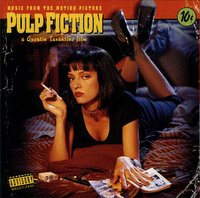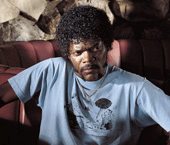pulp fiction
 Then they sat on the ground with him for seven days and nights. No one said a word to Job, for they saw that his suffering was too great for words. (Job 2:13)
Then they sat on the ground with him for seven days and nights. No one said a word to Job, for they saw that his suffering was too great for words. (Job 2:13)I love this film. I love this film so much that in a period of my life when I was getting little sleep through worry and having to crawl out of bed every day at half 6, I willingly watched it until 2am on the black and white TV in my possession.
Several occasions in the film resonate in particular: when Mia Wallace says: "That's when you know you've found somebody special. When you can just shut the fuck up for a minute and comfortably enjoy the silence," when Jules does his bit of spontaneous exegesis in a roadside diner, when the young black guy gets his head blown off and Walken's monologue. These are moments that stand out in an outstanding film.
First example because of a pathetic need for romance. Girls are feeble when it comes to moments where fantasy meets real life. The vision of being able to enjoy silence (which involves acres of unspoken profundity) with a man is very seductive, especially for girls who have things to say, and feel pressurised - by the fear of being boring - to say them. The character of Mia Wallace, who is infinitely cool and composed, even when recovering from an adrenaline hypodermic in her torso (one of the funniest moments in film) , wants to enjoy silence with someone. Perhaps it's not so unusual that girls see enjoying silence as some kind of pinnacle for a relationship: men traditionally enjoy sport/films/computer games together that means the minimal of communication, women traditionally enjoy hours together of chatting, sharing and much meaningful communication. Being able to defer to your man's interests by shutting the fuck up represents feminine deference, and a tangible relationship difference between that of you and your girlfriends. Not only that, if you can shut the fuck up and the guy doesn't dump you for being dull, or even keeps you because you're not a mouthy bitch, then the relationship has, at the very least, a short term future.
 Second, because I believe Jules' conversion represents one that rivals Paul's, particularly because there is the comparison of Vincent's response to the divine intervention. One man sees the experience as something life changing, the other sees it as coincidence. Surely on some level this is the essence of faith? True, this is a gross generalisaion, but when talking to people, there are elements of explaining one's faith that have to be understood on an instinctual basis. Vincent does not hear what Jules has to say - we never find out what the Tim Roth character makes of the personal exegesis - and it makes sense, because even with examples of God's power that equate to having six rounds of a magnum fired at you, point-blank range, without hitting their mark, some people do not hear.
Second, because I believe Jules' conversion represents one that rivals Paul's, particularly because there is the comparison of Vincent's response to the divine intervention. One man sees the experience as something life changing, the other sees it as coincidence. Surely on some level this is the essence of faith? True, this is a gross generalisaion, but when talking to people, there are elements of explaining one's faith that have to be understood on an instinctual basis. Vincent does not hear what Jules has to say - we never find out what the Tim Roth character makes of the personal exegesis - and it makes sense, because even with examples of God's power that equate to having six rounds of a magnum fired at you, point-blank range, without hitting their mark, some people do not hear.Third because it's a powerful moment of film that is somehow funny (helped by Tarantino's turn as a metrosexual housewife) and existential. Fourth because Walken is talented and gorgeous. This is a contraversial comment, although less so since he was in the Fat Boy Slim video. I love the moment when he turns from it being Bruce's family history to his own: "I hid this uncomfortable piece of metal up my ass for two years." Brilliant! Apparently he doesn't turn down film offers. Pretty sure this is admirably altruistic. At the very least I want it to be. I contend that the film still where he was his most attractive was Deer Hunter, in the Vietnamese cage, when the camera panned to him and he was young, vulnerable and sexy.
If I were to turn these disparate insights into moments of religious clarity I'd fail. Pulp Fiction is way too secular to resonate on a wider basis, which is a pity. Maybe I would get on with more Christians if they watched and enjoyed films like this more often.
I'm going to bed. I have drunk too much wine, and while I am alone this is good because I am not being easy, it is also not good because I am alone. Drinking that is. Alone can be good at times.


0 Comments:
Post a Comment
<< Home